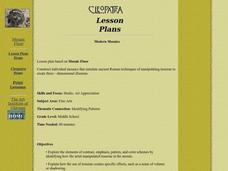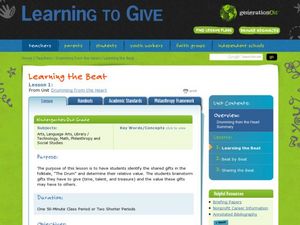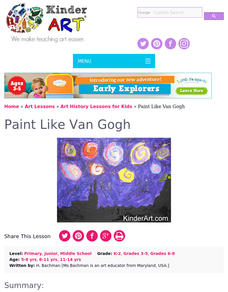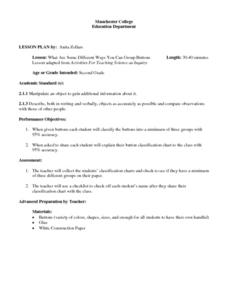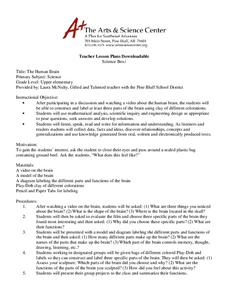Curated OER
Bubbles
Students observe the characteristics of bubbles. In this scientific inquiry lesson, students use a bubble solution and a wand to make bubbles and observe their characteristics. Students identify the shape and the color of the bubbles.
Curated OER
Putting a Spin on Current Events
Learners examine the symbolism on a 17th-century cabinet. In this symbolism lesson, students view samples of a 17th century cabinet and identify it's symbols. Learners create their own cabinet by using various art supplies and paint...
Curated OER
Social Studies: Adinkra Printing
First graders demonstrate a sense of artistic composition by creating shapes and symbols in the pattern of African Adinkra printing. They use glue to create a raised design and then print it on colored paper. Students use symbols from...
Curated OER
Solids in the Playground
First graders locate and identify solids in the schoolyard. In this geometric solids lesson, 1st graders locate two solids on the playground. They work as a group to compare and contrast them according to shape, texture, weight, size,...
Curated OER
Animal Signs
Students discuss the many different types of animal signs that can be used to identify and track animals. They participate in an hands-on activity in which they examine tracks, trails, homes, territory markings, and even "scat" left by...
Curated OER
Cherokee Leaf Printing
Young scholars investigate their local creeks and forests and practice identifying trees. For this ecology identification lesson, students utilize a pad and pencil while on a field trip near their school and describe their trip while...
Curated OER
Modern Mosaics (Grades 6-8)
Students explore the elements of contrast, emphasis, pattern, and color schemes by identifying how the artist manipulated tesserae in the mosaic. They create original mosaics by manipulating torn paper to depict different textures and...
Curated OER
Tree Talk
Students discuss trees, leaves, and the growth process In this 1st - 3rd grade lesson plan, students identify various types of leaves, recognizing the differences in size and shape. Students create tracings of various leaves to...
Curated OER
Learning the Beat
Young scholars identify gifts found in folktales. For this folktale lesson, students read the Hindi folktale "The Drum" and discuss the value of gifts such as time, talent, treasure, etc. Young scholars also create drum beats.
Curated OER
Our Town
Fifth graders discuss the variety of feelings and emotions they may experience when someone or something dies. They identify emotions they have experienced and examine how experiencing a wide range of feelings is normal after the loss of...
Curated OER
VAN GOGH'S PAINTING STYLE
Learners identify and apply painting skills used by Vincent Van Gogh.
Curated OER
Rocks and Minerals
Students are able to describe earth processes (e.g., rusting, weathering, erosion) that have affected selected physical features in students, neighborhoods. They are able to identify various earth structures (e.g., mountains, faults,...
Curated OER
Seed Surprises
Students investigate seeds and their growth. In this agriculture instructional activity, students read the book How a Seed Grows and discuss the seed cycle. Students examine real seeds and identify their properties. Students create a set...
Curated OER
Fish Fashion 101
Students explore fish anatomy. In this fish anatomy and adaptation instructional activity, students define and identify the location of fish body parts. Students add these parts of a fish's anatomy to a life-sized fish costume worn by a...
Curated OER
Developing Environmental Awareness Through Problem Solving
Learners examine the relationships among living and non-living parts of the environment. Using their senses, they identify the objects in their classroom. In groups, they participate in experiments to discover where electricity comes...
Curated OER
What Are Some Different Ways You Can Group Buttons
Second graders classify and group buttons. They discuss how their buttons are alike and different, and identify the characteristics of their handful of buttons. Students then classify their buttons into three groups, and create a...
Curated OER
Word Play
Young scholars examine the history of Chinese American artist Xu Bing. In this multicultural lesson, students collaborate in small groups to identify letters in the artist's work, and brainstorm how they would create their own images...
Curated OER
Silouettes of New York City
Second graders create a New York City silhouette. In this visual arts lesson plan, 2nd graders view the picture book, Uptown, and identify the silhouettes. Students use construction paper, paint, and a flashlight to create artistic...
Curated OER
The Human Brain
Students identify parts of the human brain. In this biology lesson, students watch a video about the human brain. Students use different colors of clay to construct and label the three parts of the brain.
Curated OER
Artsy Insects
Students identify and describe the elements of art and principles of design by creating several different butterfly pictures that represent color, shape, texture, pattern or symmetry.
Curated OER
Angles in Art Lesson
Learners examine the correlation between art and math. Using their computers, students construct and measure angles. Learners identify the properties of angles and polygons. They engage in the Angles program on their Palm and use the...
Curated OER
Class Bear Book
Students use the story, "Brown Bear, Brown Bear, What Do You See?" to explore the concept of color, name writing, and text sequencing. A personal page is created for the class Big Bear Book.
K5 Learning
Rocks
Five short answer questions follow an informational reading passage that details the three different types of rocks—sedimentary, igneous, metamorphic—and their rock cycle.
American Museum of Natural History
Trip Up Your Brain
Sometimes different parts of the brain disagree. See what this disagreement looks like using a remote learning resource to experience how brains often take shortcuts. Pupils complete the activity, observe their results, and then read...








